 The SEC settled charges against CRBE, a Dallas-based commercial real estate services and investment firm, for using a clause in their separation agreements that violated the Securities and Exchange Commission’s whistleblower protection rule. Departing employees could receive separation pay only if they signed a release that stated they had not filed any complaints against the firm with the SEC or any other federal agency. This violates the SEC’s whistleblower protection rule for those employees. During 2021 and 2022 nearly 900 former employees had signed this release as part of their separation agreement. Continue reading
The SEC settled charges against CRBE, a Dallas-based commercial real estate services and investment firm, for using a clause in their separation agreements that violated the Securities and Exchange Commission’s whistleblower protection rule. Departing employees could receive separation pay only if they signed a release that stated they had not filed any complaints against the firm with the SEC or any other federal agency. This violates the SEC’s whistleblower protection rule for those employees. During 2021 and 2022 nearly 900 former employees had signed this release as part of their separation agreement. Continue reading
SEC Sanctions Monolith Resources For Violation Of Dodd-Frank Act
 Can a company prohibit former employees from speaking to federal regulators, such as the SEC, and function as a whistleblower? They can certainly try, but it is still illegal.
Can a company prohibit former employees from speaking to federal regulators, such as the SEC, and function as a whistleblower? They can certainly try, but it is still illegal.
Monolith Resources, LLC, based in Nebraska, included language in their employment separation agreements prohibiting departing employees from recovering money through participation in investigations, enforcement actions, or filing claims with the government. This includes participating in the SEC’s Whistleblower program. Continue reading
SEC Awards $18M Bounty To Latest SEC Whistleblower
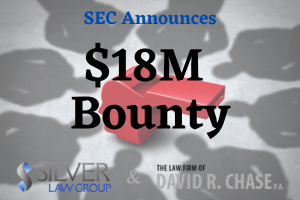 The SEC recently announced yet another sizeable award to an individual who came forward as a whistleblower. In the press release, the SEC described the $18 million award to a single individual who “refused to turn a blind eye to the wrongdoing, reporting misconduct internally and then to the Commission.” Continue reading
The SEC recently announced yet another sizeable award to an individual who came forward as a whistleblower. In the press release, the SEC described the $18 million award to a single individual who “refused to turn a blind eye to the wrongdoing, reporting misconduct internally and then to the Commission.” Continue reading
Seven Whistleblowers Collect $104M From SEC And Other Agencies
In the SEC’s latest press release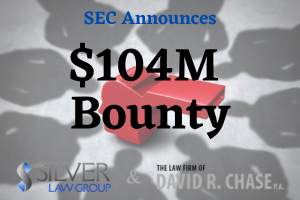 , seven individuals have received bounties after supplying credible information and continued assistance that led to a successful enforcement action. The same information and assistance led to another successful related action by a different federal agency. The bounty of $104 million is the fourth largest award in the history of the SEC’s Whistleblower program. Continue reading
, seven individuals have received bounties after supplying credible information and continued assistance that led to a successful enforcement action. The same information and assistance led to another successful related action by a different federal agency. The bounty of $104 million is the fourth largest award in the history of the SEC’s Whistleblower program. Continue reading
SEC Awards $9M Bounty To Persistent Whistleblower
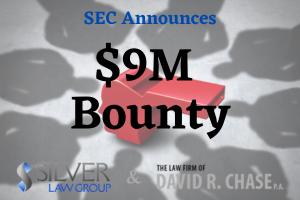 The SEC has announced its latest whistleblower bounty of approximately $9 million to one individual. The amount represents a percentage of the collected monetary sanctions from the enforcement actions.
The SEC has announced its latest whistleblower bounty of approximately $9 million to one individual. The amount represents a percentage of the collected monetary sanctions from the enforcement actions.
In the press release, the SEC stated that the individual “repeatedly” reported their concerns internally before submitting their information to the Enforcement Division. The whistleblower then provided “substantial and ongoing cooperation” to SEC staff, which included substantial, comprehensive information that led to a successful enforcement action. Continue reading
CFTC Seeking Whistleblower Tips On Carbon Credit Market Fraud
 The Commodity Futures Trading Commission has issued a press release regarding fraud surrounding the buying and selling of carbon credits, which fall under the category of commodities. The CFTC is interested in whistleblower tips about anyone engaged in misconduct in the sale or trade of these credits. Employees, investors, and anyone else who finds fraud or believes it may exist is encouraged to get in touch with the CFTC. Continue reading
The Commodity Futures Trading Commission has issued a press release regarding fraud surrounding the buying and selling of carbon credits, which fall under the category of commodities. The CFTC is interested in whistleblower tips about anyone engaged in misconduct in the sale or trade of these credits. Employees, investors, and anyone else who finds fraud or believes it may exist is encouraged to get in touch with the CFTC. Continue reading
Social Media Influencers—When Does A Post Or A Video Cross The Line From Promotion To Securities Fraud?
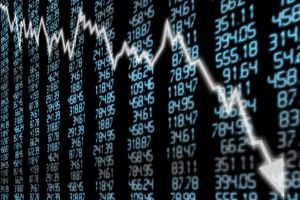 In December 2022, the social media world was stunned to learn that federal prosecutors and the Securities and Exchange Commission (SEC) were filing civil and criminal charges against eight social media influencers. According to the complaints, the prosecutors and SEC accuse the influencers of using their social media visibility to manipulate stock prices—a $114 million fraud scheme. As we will discuss below, the case highlights the line between legitimate advice to investors and illegality, whether it’s dispensed online for the public or in more traditional forms of investor communications. Continue reading
In December 2022, the social media world was stunned to learn that federal prosecutors and the Securities and Exchange Commission (SEC) were filing civil and criminal charges against eight social media influencers. According to the complaints, the prosecutors and SEC accuse the influencers of using their social media visibility to manipulate stock prices—a $114 million fraud scheme. As we will discuss below, the case highlights the line between legitimate advice to investors and illegality, whether it’s dispensed online for the public or in more traditional forms of investor communications. Continue reading
A New Anti-Money Laundering Act Becomes Law
 Largely ignored amidst the fanfare (and controversy) surrounding the spending bill that President Biden signed into law at the end of the year is a historic provision relating to whistleblowing and anti-corruption efforts. Industry experts have heralded passage of the Anti-Money Laundering (AML) Whistleblower Improvement Act as a vital step against foreign and domestic corruption. Continue reading
Largely ignored amidst the fanfare (and controversy) surrounding the spending bill that President Biden signed into law at the end of the year is a historic provision relating to whistleblowing and anti-corruption efforts. Industry experts have heralded passage of the Anti-Money Laundering (AML) Whistleblower Improvement Act as a vital step against foreign and domestic corruption. Continue reading
What To Know About The SEC’s “EPS Initiative”
 On September 28, 2020, the Securities and Exchange Commission (SEC) announced it had settled actions against two public companies for improperly reporting their quarterly Earnings Per Share (EPS). These actions were the first to come out of the agency’s Division of Enforcement’s “EPS Initiative.” A handful of other companies have been investigated since then due to the initiative, and there are signals that this is just the beginning. For SEC whistleblowers, the EPS Initiative and related enforcement actions shine new light on companies’ malfeasance and liability. Continue reading
On September 28, 2020, the Securities and Exchange Commission (SEC) announced it had settled actions against two public companies for improperly reporting their quarterly Earnings Per Share (EPS). These actions were the first to come out of the agency’s Division of Enforcement’s “EPS Initiative.” A handful of other companies have been investigated since then due to the initiative, and there are signals that this is just the beginning. For SEC whistleblowers, the EPS Initiative and related enforcement actions shine new light on companies’ malfeasance and liability. Continue reading
A Brief History of the SEC Whistleblower Program: What Happened and How It Impacts Whistleblowers Today (Part 2 of 2)
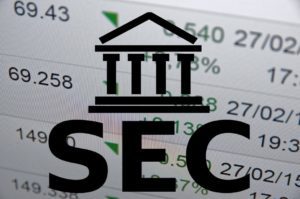 In our last post, we went over a brief history of the Securities and Exchange Commission (SEC) whistleblower program—including its creation in the aftermath of the catastrophic multi-billion dollar Ponzi schemes run by Bernard Madoff and Alan Stanford, and the recognition that the SEC had been repeatedly warned about both frauds but failed to act on the information. We also reviewed some of the ways in which the SEC has revised the program in recent years. This post explores the impact of the program’s origin and those early challenges on whistleblowers today. Continue reading
In our last post, we went over a brief history of the Securities and Exchange Commission (SEC) whistleblower program—including its creation in the aftermath of the catastrophic multi-billion dollar Ponzi schemes run by Bernard Madoff and Alan Stanford, and the recognition that the SEC had been repeatedly warned about both frauds but failed to act on the information. We also reviewed some of the ways in which the SEC has revised the program in recent years. This post explores the impact of the program’s origin and those early challenges on whistleblowers today. Continue reading
 SEC Whistleblower Lawyer Blog
SEC Whistleblower Lawyer Blog

